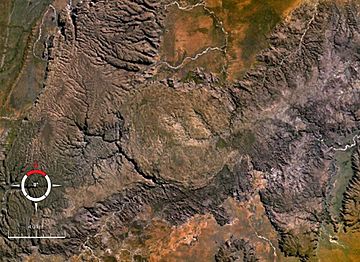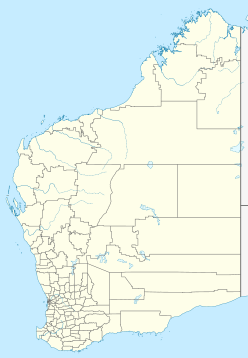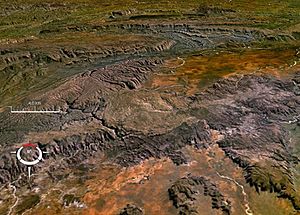Piccaninny crater facts for kids

Landsat image of the deeply eroded remnant of Piccaninny crater (circular feature in centre); screen capture from the NASA World Wind program
|
|
| Impact crater/structure | |
|---|---|
| Confidence | Confirmed |
| Diameter | 7 km (4.3 mi) |
| Age | <360 Ma <Devonian |
| Exposed | Yes |
| Drilled | No |
| Location | |
| Location | Purnululu (Bungle Bungle) National Park |
| Coordinates | 17°25′30″S 128°26′10″E / 17.42500°S 128.43611°E |
| Country | Australia |
| State | Western Australia |
The Piccaninny crater is a special place in northern Western Australia. It's not a volcano, but an impact structure. This means it's the worn-down remains of a giant hole made when a space rock, like an asteroid, crashed into Earth a very long time ago.
This amazing site is found in the Purnululu (Bungle Bungle) National Park. It was named after a nearby creek called Piccaninny Creek.
Contents
What is the Piccaninny Crater?
The Piccaninny crater is a circular shape that you can see from above. It sits on top of the Bungle Bungle Range. This range is made of flat-topped sandstone and conglomerate rocks.
How Was It Discovered?
People first noticed this circular feature in 1983. They saw it from an airplane. At first, they weren't sure what it was. Some thought it might be from a volcano. Others thought it was from an impact.
Later, two scientists, Eugene Shoemaker and Carolyn Shoemaker, visited the site. They studied the rocks on the ground. They found special signs of damage in the rocks. These signs proved that the circular shape was indeed made by an impact from space.
What Does It Look Like Today?
The circular feature you see today is about 7 kilometers (4.3 miles) wide. However, the original crater was likely much bigger. Over millions of years, wind and rain have worn away a lot of the rock.
Scientists believe that the ground we see now is about 1 to 2 kilometers (0.6 to 1.2 miles) below where the original crater floor used to be. This shows just how much erosion has happened!
How Old Is the Crater?
We don't know the exact date when the space rock hit. But we do know it happened after the Devonian period. The rocks in the area formed during the Devonian period, which was over 360 million years ago.
Because so much of the crater has been worn away, we know it's not a recent event. It happened a very, very long time ago, long before humans were around.
 | James B. Knighten |
 | Azellia White |
 | Willa Brown |



